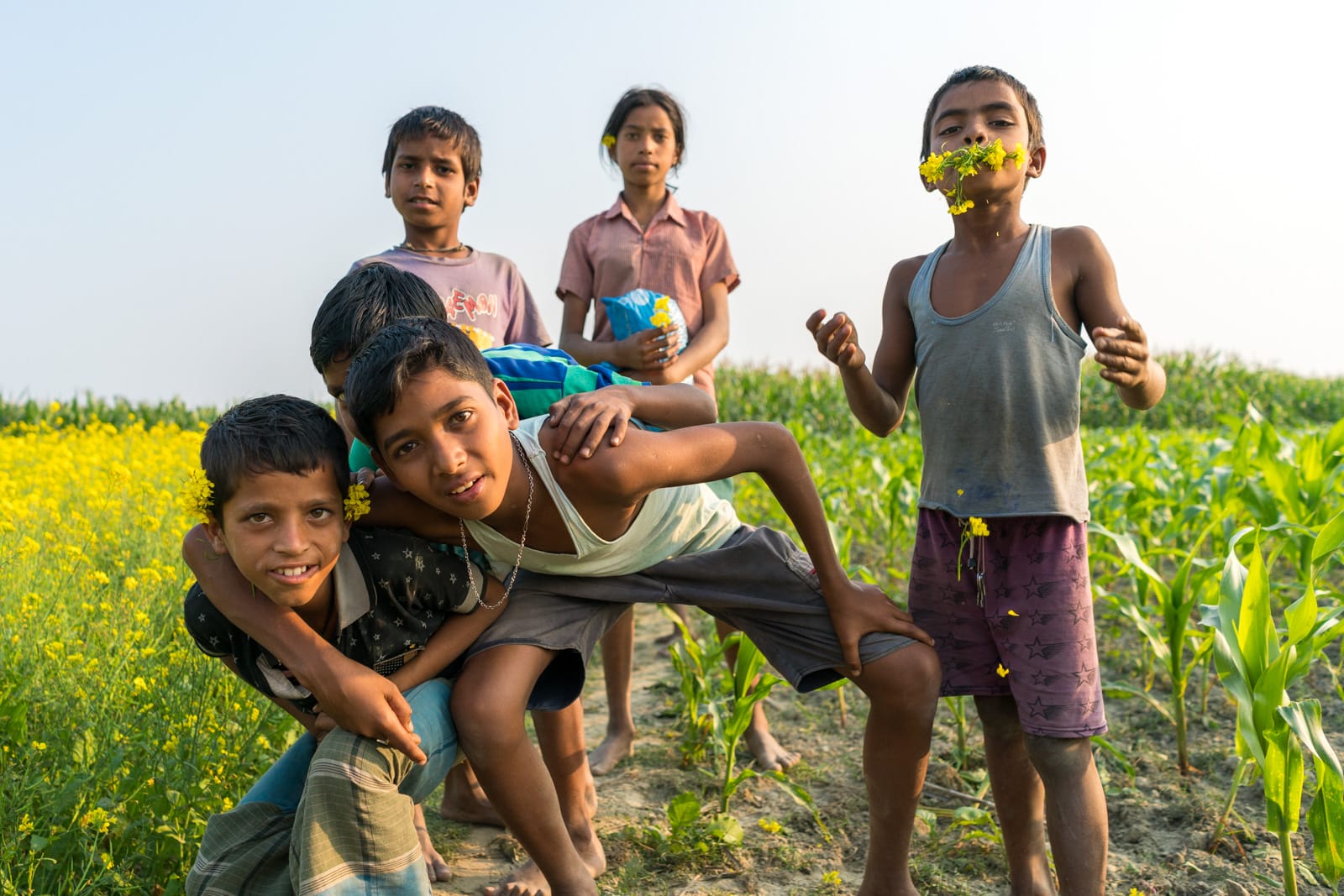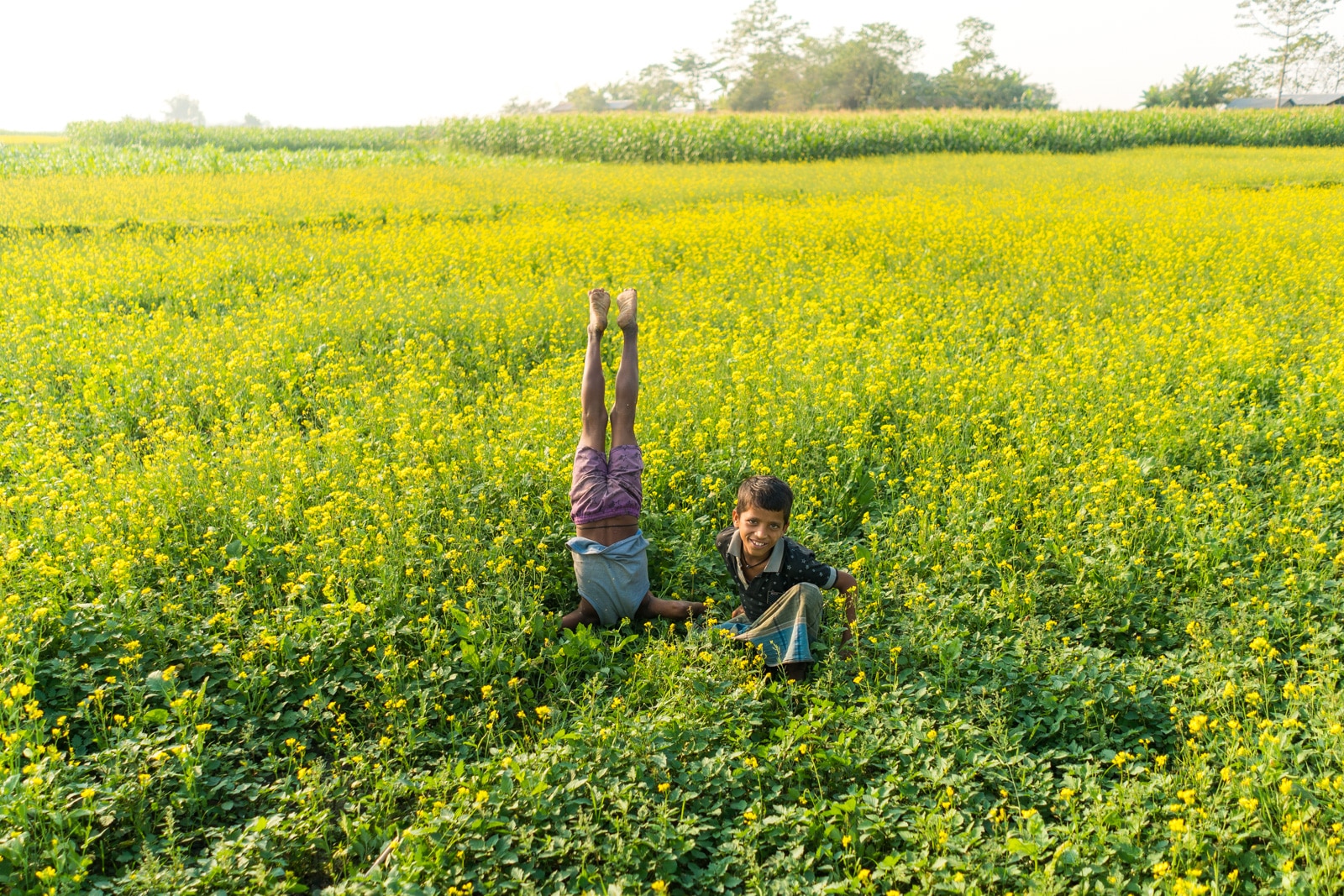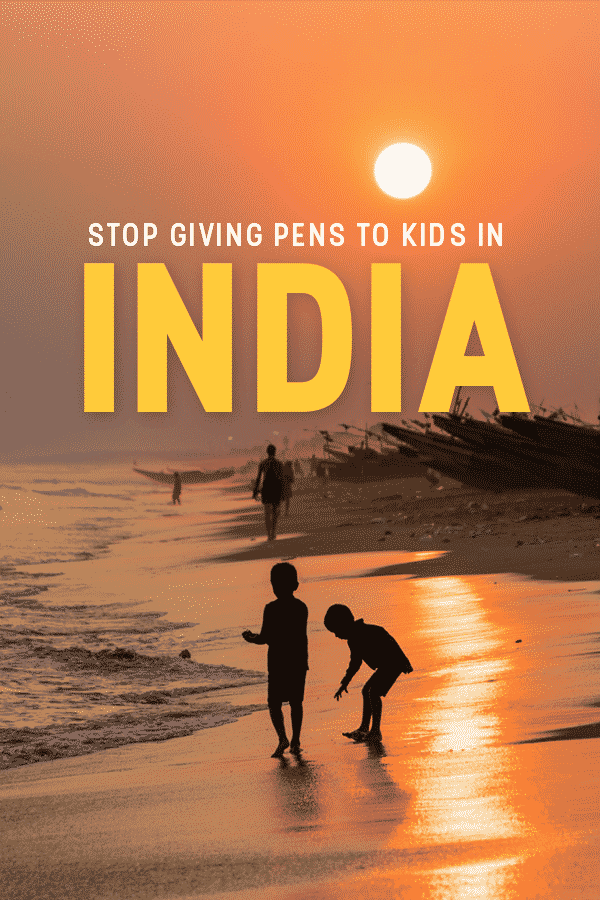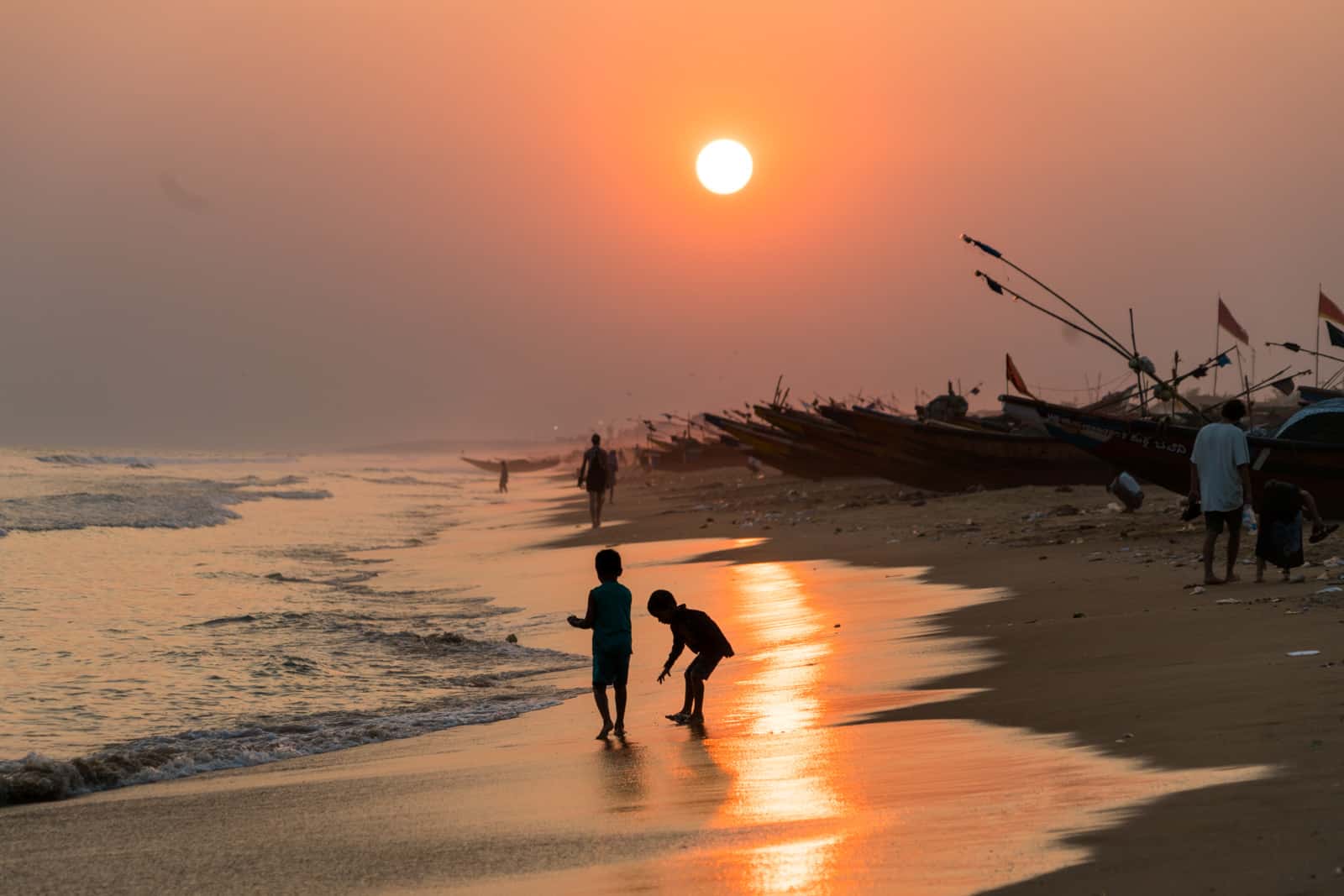Giving pens to children in India is a big no no for foreign tourists. Though it may seem an innocent act of goodwill, it has some long-lasting repercussions. Here’s why you should stop giving pens to children in India, and some alternative ways to give to children in the country.
In that moment, the child is the most adorable child in the world.
Big brown eyes, a blindingly white smile, little school uniform so perfectly pressed. Their tiny feet pound the ground as they run toward you, their backpack flapping on their back haphazardly. Other children, noticing you, begin to congregate around your legs. As they look up at you, heads just barely coming up to your belly, you can’t help but smile yourself. You’re about to experience the “real” India all those guidebooks talk about.
… then it begins.
“Pen?”
“What is your name? Give me pen!”
“No pen? Give me money!”
Like a flock of noisy seagulls, a high-pitched chorus of demands rises from the throng, and what started out as a emotional moment has ended with you being treated as a human vending machine.

PEN! PEN! PEN!
Resist and desist
It’s a common scene throughout India, as well as other countries. Big-hearted (or deep-pocketed) foreign tourists come in, encounter The Most Adorable Children Ever living in less-than-ideal conditions, and heartstrings are tugged. The tourists buy them pens, candy, some cheap toys. The children are delighted, the tourists feel like saints, everybody wins, right?
Wrong. Though intentions may be good, the repercussions are not:
- Children will expect foreigners to hand out free goods to them. There’s another word for this: begging. Are you comfortable encouraging begging?
- If begging is incentivized, children may drop out of school in favor of taking to the streets and collecting goods from foreigners. Why go to school when you can profit on the streets?
- Scams emerge where children ask tourists to buy them goods, then return the goods to the shop in exchange for a profit.
- “Begging mafias” might recruit the children to work for them. Children are often maimed as a way of making them more pitiable, and thus profitable.
Put your parenting hat on
“Oh, you’re so cold hearted,” you might be thinking, “a pen is just a little gift. Besides, they need it!”
Not convinced, eh? Let’s try another approach: imagine you’re a parent. If your child walked up to you and demanded you give them something, would you give in?
What if, when you denied their demand, they then insist you give them money?
… I’m thinking the answer is something along the lines of “Aww hell naw.” If you wouldn’t give in then, why would you do the same to someone else’s children on the street?

Photoshoot time! (With consent from their parents to both take photos and put them online.)
What you can do instead of giving pens to children in India
I’m not saying you should turn into a miser and lock your heart away forever. It’s okay to want to help out people in need—just make sure you do so responsibly. Here are 5 alternatives to giving pen to children in India:
1. Buy school supplies from a local convenience store and give them to a teacher.
This kills several birds with one stone:
- You contribute to the local economy by buying the pens locally.
- This ensures donations end up in the right hands, and prevents children from squabbling over who gets what.
- School supplies cannot be as easily misused as cash donations.
- You ultimately get to give kids pens. Wins all around!
2. Have a mini-photoshoot.
Kids everywhere in the world love to ham it up for the camera. If you have a digital camera, ask if you can take their photo—the answer will definitely be yes—and snap away! Show them the photos you take, and you’re sure to be rewarded with all kinds of giggles, squeals, and demands to take more photos.
Even better: let them take some photos, too! Just make sure they’re gentle with your camera or phone.
If you want to take it to the next level, consider getting an instant camera for those really special kids. Photos can be expensive, and many families don’t have the money or resources to have photos taken of themselves. An instant photo is a nice gift that can be cherished much more than a pen… and they’re more fun!
Tip: Try to only do this when the family is around, or when there aren’t too many children. Otherwise it may lead to some bickering about who gets to keep the photo(s) in the end.

3. Take some time to talk or teach a special high five or game.
Children might be interested in material objects, but you have something much more valuable to offer them: a chance to exercise language skills! Most are delighted to do so, and hand games and high fives are something that can easily be explained in basic English and can be used amongst themselves for days to come.
4. Go on a responsible tour that benefits the children’s community
Being a good tourist is in right now (let’s hope it’s never passé), and tour operators have been listening. “Responsible” tours ensure local communities benefit by distributing proceeds among the communities they operate in, crafting itineraries with local leaders, properly disposing of waste, etc.
One example is the New Delhi Walking Tour. Run by the Salaam Balak Trust, it provides education, shelter, and medical help to street children in Delhi.
5. Donate to an NGO or charity that works with children in India.
Sometimes, we need to accept that we have no freakin’ clue what’s best for people. And that’s okay.
There are hundreds of charities and NGOs that work to improve living conditions and education for children in India. They know what’s up, to say the least, and giving money to them can be much more effective (and efficient) than figuring out what to do yourself.
It’s important, however, to donate to organizations that have proven to be effective. To save you some time, here are several reputable Indian organizations you can donate to:
- Seva Mandir works to improve the lives of people—including children—in rural Rajasthan. This includes providing quality education and proper child care.
- Smile Foundation has a variety of aims, one of which is to provide proper education and nutrition for children in school.
- Chirag is working to improve the quality of education and general welfare of young students in the Kumaun region of Uttarakhand.
- Akshaya Patra combats malnutrition by providing mid-day meals to more than 1.7 million school children every day.
- Aarohi has a youth program that goes beyond the classroom and promotes extracurriculars like sports, trekking, and just playing outside—all essential to ensure kids stay away from crime and drugs.
Go forth, and be responsible
So ends my sermon. I know not everyone will agree with me (woe is me, I have failed), and there are other alternatives I haven’t touched upon. That’s where you come in.
What’s your opinion on the subject? Do you give to children and beggars?

Pin it!
Yay transparency! Some of the links in this post are affiliate links, which mean if you book or buy something through the link I’ll make a small commission at no extra cost to you.



This reminded me of our trip to India many many years ago. We were there with the group and many people were prepared for this since they brought toys and school supplies from home in order to hand them out to the children. I had very mixed feelings about it back then, I still do now. It’s good that you try to raise awareness and show people that there are much better alternatives!
I saw that in Africa… It was almost like watching people feeding birds or fish, just tossing things out the window and watching kids snap them up. Definitely uncomfortable!
I don’t understand …. pens are necessary for scchool. If you don’t want kids to drop out of school to beg, don’t give them money. But giving them supplies they need for school? That helps them stay in school! Personally I believe if you’re travelling somewhere, you have privalege, and with privalege comes and obligation to give and do good. This is why I try to give to beggars whenever I’m able. I don’t really care if a child in a developing nation is acting in a way that we could call spoiled for a privaleged first world child. That child isn’t spoiled. It isn’t the same behavior as a kid who has no problem getting pens or school supplies demanding something they want, rather than need. These kids need pens. It’s not something superfluous. It’s not candy or money or toys. It’s a school supply!! They’re not spoiled for asking for a necessary item for school from a privaleged traveler.
The kids need pens, but that doesn’t mean you are the one that should give them the pens. Like I said, giving freely encourages begging, which actually encourages them to LEAVE school as begging is more lucrative in the short term. Families and mafias also play a big part in encouraging children to roam the streets and beg for a profit.
Sure, foreign tourists are more privileged, but that doesn’t mean you have an obligation to provide for random children on the street. Children shouldn’t be dependent on foreigners for their school supplies, it’s as simple as that. Instead, use your financial privilege to give back in one of the more responsible ways I listed in the article.
I have to agree with the article, I don’t think you are JUST talking about pens, but even so, there are so many ways to get schools improved so that kids stay interested and have great quality that could lead them out of the vicious cycle they might live in. Another option is to volunteer, I know it is a difficult topic and I agree with you that we don’t know what others need so don’t try to be something you’re not just because you have some education, volunteer in something that you can actually do! That way you’ll sure help and share with others with the same interests. It is not only about raising money, giving material things but also to teach some skills to locals that can actually benefit in the long run. Thanks for sharing
Thanks for this comment. Pens is just a general example, because it is asked for the most. We do think that volunteering your time is a much better way of helping. Do make sure that you have actual skills to volunteer though. Voluntourism can do as much harm as it can do good. Raising money for reputable organizations in an excellent way of volunteering your time, we think.
A year back I encourage volunteering as I find it could be a great way to help & learn what it is really needed. Then I talked to people, read articles and realised that people just sign up for any volunteering program not even knowing what they are doing. I never ever meant that!!! I mean I have no clue of what it is needed to drill a well hens I couldn’t volunteer/work there! For me this makes sense, it is logical, I’m not a doctor so I wouldn’t go trying to be a doctor in any hospital (I don’t think anyone sane would do that either) why would I do that in a developing country???! But for some reason there is people who think that is acceptable. Volunteering (knowing what you are doing of course) could be the most enriching experience for both parties, but if you don’t have the time, the skills or the will then there are other ways to have an impact in a community.
Agree 100%. That’s what we meant to in our first reply to your comment. If you don’t know what you’re doing, you’re doing more harm than good. Let’s hope more people will start realizing that.
An interesting perspective, and a really good reminder to those of us who think we are doing good by giving out candy and treats. Thanks for pointing out the other side.
Thank you. It’s important that people think about the (unintended) consequences of their actions. Too often this doesn’t seem to happen.
Hmmm…I don’t agree fully… Ofcourse, after a while, the children will see tourists only as walking money or material benefits, but like you suggested….take pitures and let them see them…Street children can’t fill their stomach with that. Sponsor the local projects. Many projects are good, but still too many children not allowed to school because of no money… It’s not because you give the teacher or school some money or material, that they will accept streetchildren! It’s more complicated than that! If u like pictures, then give them some clothes, or let them eat your leftover food on the terrace where u are eating… But i understand your way of thinking. But don’t get coldhearted by ignoring them. Everyone has to do, what his heart says to do… Then the world will become better…
This is the problem. You think that not giving is cold-hearted, and that children here have no choice. In some cases that might be true, but public elementary schools, though often bad, are free here. So not sending your children to school is always a choice.
Giving anything to begging children perpetuates the problem, as it teaches people that begging is profitable, more profitable than schooling in the short term. This in turns leads to more children begging, and foregoing education. By giving things to beggars, you are helping to create a never ending cycle of begging and reward. Now THAT is cold-hearted!